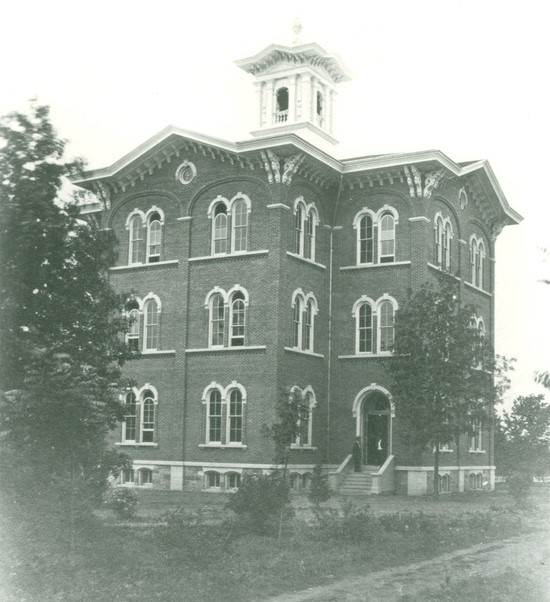On the outside, Seventh-day Adventist universities may not look much different than other college campuses. But the real differences are beneath the surface.
Adventist Universities are all about helping each student have a fulfilling educational journey on a Christ-centered campus. Lifelong friendships are forged. Pivotal career decisions are made. And the supportive spiritual environment can help students grow in immeasurable ways.
Let’s take a closer look at what makes Adventist universities so loved by both their alumni and their surrounding communities.
- The story of the Adventist college
- What is the mission of Adventist universities?
- Why would someone choose an Adventist university?
- Adventist universities in East-Central Africa
We’ll start with some history.
The story of the Adventist college

Courtesy of the Ellen G. White Estate, Inc.
The first Adventist college was born in 1874 with Battle Creek College in Michigan, USA (present-day Andrews University). The Adventist Church was exceptionally committed to quality education, especially coming out of a time when the United States was more industrially focused than scholastically focused.
These campuses also provided a place to formally train pastors and teachers, as well as other professions that were in high demand for mission service.
A few years later, Pacific Union College’s forefather, Healdsburg College, opened in 1882 in California, USA.
This was closely followed by the Battle Creek College Training School for Nurses within the Battle Creek Sanitarium, which spurred the development of Adventist nursing schools, hospitals, and eventually, medical schools.
In 1895, the Sanitarium began the first Adventist medical school, American Medical Missionary College.
In 1893, Claremont Union College in South Africa became the first Adventist college outside the United States. Soon after, Adventist universities opened in Australia, South America, and Europe, respectively.
Today, Adventist universities have blossomed everywhere. There are currently 117 Adventist colleges dotting the globe including nine in the East-Central Africa Division,1forming the second-largest Christian school network in the world.2
What is the mission of Adventist universities?
Originally, Adventist education began with the purpose of training denominational workers and providing children with a higher quality education than was typically available at the time.3
Today, the goal isn’t much different: Adventist universities equip students with the necessary skills for today’s workforce, while also teaching them how their faith can be woven into everything they aspire to do.
Adventists believe that education is key when it comes to being good stewards of our minds and our talents. This echoes the Bible’s emphasis that pursuing knowledge and getting to know God goes hand in hand (Proverbs 9:10).
With this in mind, Adventist colleges operated with an emphasis on each student being a unique individual with God-given gifts.4 Students were to be encouraged to use the abilities God gave them, so they can become cheerful contributors to their communities.
That’s why Adventist universities provide a well-rounded education to promote spiritual, mental, physical, and social health, intellectual growth, and service.5
Along with serving, Adventist universities promote excellence, intelligence, engagement, and community. All these support the umbrella of faith, to best equip students to relay the gospel to the world.6
And if anyone is considering a career in health care, an Adventist university can be a terrific fit due to the special emphasis Adventists place on the need for caring, quality medical care.
Let’s take a look at some of the specific reasons people choose Adventist colleges.
Why would someone choose an Adventist university?

Photo by Keira Burton
A number of things set Adventist universities and colleges apart.
- Variety of quality programs: Adventist universities offer competitive programs in a wide range of majors—both undergraduate and graduate.
- Diversity: Attracting students from all over the world causes Adventist campuses to be diverse places, which can enrich the educational experience. As of 2018, Andrews University in the United States ranked #1 in campus ethnic diversity. That year, 20% of their students came from other countries.12 Adventist universities in Africa tend to also be diverse in that they’re intercontinental, attracting students from many different countries within Africa. Adventists are not the only students who attend, either. In some cases, the schools even have more non-Adventist than Adventist attendees. For example, the Adventist University of Central Africa (Rwanda) had 2,530 non-Adventist students and 1,024 Adventist students in December of 2021.7

Photo by Wallace Chuck
- Close-knit campuses: Adventist colleges tend to have a smaller student body. Their schools in East-Central Africa range from 79 students (Adventist University of Central Africa) to 4,948 (University of Eastern Africa Baraton).8 Compare this to the numbers of all other African universities, such as the University of Nairobi, which had 36,251 students in the school year of 2022-2023.9 Students at large universities can feel like just a number, while smaller universities help students feel like a meaningful part of the community.
- Biblical emphasis: Throughout all parts of the college experience, students learn how the Bible can be part of every aspect of their lives. This is even woven into the class structure. It’s common for professors to offer prayer before class and sometimes share a Bible text or relevant devotional thought.
How can I attend an Adventist university?
Attending an Adventist university is relatively easy. You don’t have to worry about a massive number of students also applying for the same program.
A quick search can tell you which Adventist university is closest to you, or you can look up several of them to see which ones have the programs you’re interested in. You can schedule a visit first, or you can dive right into the application process.
Yes, Adventist schools are private institutions and tend to have a heftier price tag. However, most schools offer scholarships to help ease the financial burden. Other financial aid is also available. Be sure to check out what each Adventist university offers.
Adventist universities in East-Central Africa
In the East-Central Africa Division, nine universities and colleges serve their students. These are:
- Adventist University of Africa, Kenya
- Adventist University of Congo, Democratic Republic of Congo
- Adventist University of Central Africa, Rwanda
- Adventist University of Goma, Democratic Republic of Congo
- Bugema University, Uganda
- Ethiopia Adventist College, Ethiopia
- University of Eastern Africa Baraton, Kenya
- Adventist University of Lukanga, Democratic Republic of Congo
- The University of Arusha, Tanzania
The church also operates a number of other universities around the world:
- Africa: 25
- Angola
- Botswana
- Cameroon
- Democratic Republic of Congo
- Ethiopia
- Ghana
- Kenya
- Liberia
- Madagascar
- Malawi
- Nigeria
- Rwanda
- South Africa
- Tanzania
- Uganda
- Zambia
- Zimbabwe
- Asia: 27
- Bangladesh
- China
- India
- Indonesia
- Japan
- Lebanon
- Malaysia
- Myanmar
- Pakistan
- South Korea
- Sri Lanka
- Taiwan
- Thailand
- Australia: 2
- Europe: 16
- Croatia
- Denmark
- Finland
- France
- Germany
- Hungary
- Italy
- Norway
- Poland
- Romania
- Russia
- Sweden
- Ukraine
- United Kingdom
- North and Central America: 29
- Belize
- Canada
- Costa Rica
- Cuba
- Dominican Republic
- Haiti
- Jamaica
- Mexico
- Puerto Rico
- Trinidad and Tobago
- United States of America
- Venezuela
- Pacific Ocean Islands: 15
- Fiji
- Papua New Guinea
- Philippines
- South America: 18
- Argentina
- Bolivia
- Brazil
- Chile
- Colombia
- Ecuador
- Peru
- Uruguay
Some of the most noteworthy universities around the world include:
- Loma Linda University: Loma Linda is a large California university best known for its robust graduate medical programs.
- Adventist University of Africa: From Kenya, this institution was built to educate post-graduates in Africa. It offers theological, business, leadership, public health, and computer science degrees.
- Adventist University of France: Also called Campus Adventiste du Salève, this university is the only French-speaking Adventist institution in Europe.
- Adventist University of the Philippines: Based in Puting Kahoy, Silang, Cavite, Philippines, this school offers degrees ranging from the arts to medicine.
- Avondale University: Australia’s university in New South Wales offers a variety of programs and has a well-known nursing program.
- Andrews University: One of the most culturally diverse universities in the United States, Andrews attracts students to its campus in Berrien Springs, Michigan. It is particularly known for its theological seminary.
- Newbold College: Situated in Binfield, Great Britain, students can earn a variety of religion, liberal arts, and business degrees. The school is part of Adventist Colleges Abroad.
- University of Montemorelos: One of five Adventist universities globally that grants degrees in medicine, this college in Nuevo León, Mexico, offers a large selection of programs.
Adventist universities are not only a place to earn a degree. They prepare the student for being a good citizen in their community and serving others. As Colossians 3:23-24 says, all of our work should be done well, as if for God. And this underlying principle fuels the pursuits of each Adventist higher learning institution.
- Adventist Universities.com, Accessed July 14, 2022. [↵]
- “About Seventh-day Adventist Education,” Adventist Universities, https://adventistuniversities.com/adventist-education/. [↵]
- “The Birth of Adventist Education,” Lineage Journey, https://lineagejourney.com/read/the-birth-of-adventist-education/. [↵]
- Ibid. [↵]
- Ibid. [↵]
- Taylor, John Wesley V, “What is the Special Character of an Adventist College or University?” The Journal of Adventist Education, https://jae.adventist.org/2017.2.5. [↵]
- “World Report 2021: Adventist Education Around the World,” General Conference of Seventh-day Adventists Department of Education, Dec. 31, 2021. [↵]
- Ibid. [↵]
- Mutua, John, “Low Enrolment Hits University of Nairobi, Moi and Kenyatta,” Business Daily, May 8, 2023. [↵]
Related Articles
More Answers
What Is ASI (Adventist-Laymen’s Services and Industries)?
ASI, which stands for Adventist-laymen’s Services and Industries, is a membership-based organization that provides support for Seventh-day Adventist laypeople (Adventist professionals who aren’t pastors).
Sola Scriptura—What Does It Mean, and Why Is It So Important?
Sola scriptura is a term that originated during the Protestant Reformation. It represents the way many Christians view the Bible and its authority.
What is the Concept of “Present Truth” and Why is it Important?
Present truth is the principle that certain biblical truths are relevant to God’s people at specific times in history. God sends the Holy Spirit to reveal truths that help us better understand how to interpret and apply His Word in a present moment.
What Does the Bible Say About Modesty
The Bible teaches that modesty, a form of humility and respect, is a valuable quality in everyone—men, women and children. It has to do with how we present ourselves, which should exemplify our inner relationship with God.
13th Sabbath Offering: What It Is and Why It Matters
On the last Sabbath of every quarter, Adventist churches participate in the 13th Sabbath offering—a special offering that goes to mission fields around the world.
Adventist Movies: Where Faith and Film Meet
The Seventh-day Adventist Church’s mission from the beginning has been to share God’s truth in the Bible. And as times have changed, we’ve explored new ways of doing this—one of those being movies.
Everything You Need to Know About an Adventist Church Potluck
Every so often, usually on a schedule ranging from once a week to once a month to once a quarter, an Adventist church will have “fellowship dinners,” often casually referred to as potlucks.
How to Join the Seventh-day Adventist Church
Whether you heard about the Seventh-day Adventist Church through a traveling evangelist, during your online searches, or through a loved one or relative, you might be considering joining yourself.
How Do Adventists Make Movie and Music Choices?
We have entertainment at our fingertips. With just a tap on our smartphones, we can access all the latest movies, music, YouTube videos, and more.
Do Adventists Celebrate Birthdays?
Yes, most Seventh-day Adventists do celebrate birthdays because we see them as excellent reminders of the life God has blessed us with. And we celebrate them the same way everyone else does—with friends, family, presents, and a special meal.
Are Seventh-day Adventists Christians?
Yes, the Seventh-day Adventist Church is a Protestant Christian denomination formed in 1863. Just like other Christians, we believe that Jesus Christ is our Savior and seek to follow the principles of the Word of God.
Do Seventh-day Adventists Believe in the Secret Rapture
The secret rapture belief asserts that the followers of Jesus will be suddenly and stealthily “raptured” from earth and taken to heaven. Then, any people left on earth will face a period of great difficulty—before Christ’s second coming actually happens.
The Seventh-day Adventist Hymnal
The Seventh-day Adventist Hymnal is a songbook used worldwide by many Adventist congregations during their worship services. Since its publication in 1985, it has helped foster praise to God while reminding church members of our mission and drawing them closer to Jesus.
Do Adventists Have Their Own Bible?
Adventists have some unique beliefs—you might be able to name some of them right now. The seventh-day Sabbath. Death as a sleep. Hell as nonexistence.
Do Adventists Celebrate Communion and Foot Washing?
Like many Christian denominations, Adventists regularly participate in communion, also referred to as the “Lord’s Supper” or the “Last Supper.” They also practice foot washing (John 13:1-20), or the “ordinance of humility,” during the service—which isn’t as common.
How do Adventists choose what to eat?
Every day, parents go through the ritual of getting their kids to eat what is healthy and good while trying to steer them away from what can hinder the growth of their developing bodies. Nutritionists work with their clients to make better food choices.
What Are Seventh-Day Adventist Sermons Like?
In nearly every Seventh-day Adventist Church, the sermon is the focal point of the main service—similar to many Protestant Christian denominations. It is a time of biblical instruction by the pastor, who shares what they’ve been studying in the Bible and preparing over the previous week.
Didn’t find your answer? Ask us!
We understand your concern of having questions but not knowing who to ask—we’ve felt it ourselves. When you’re ready to learn more about Adventists, send us a question! We know a thing or two about Adventists.



















